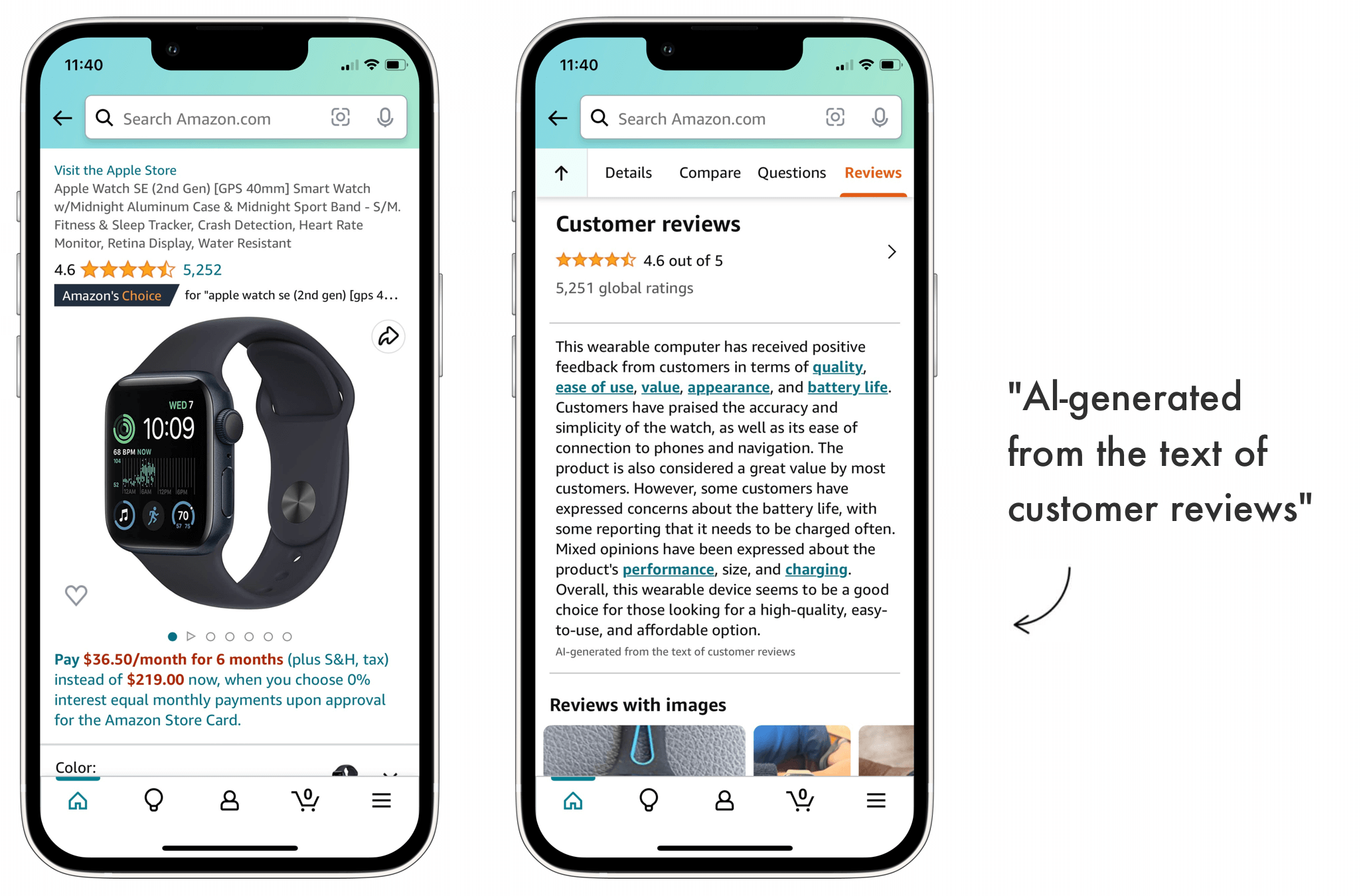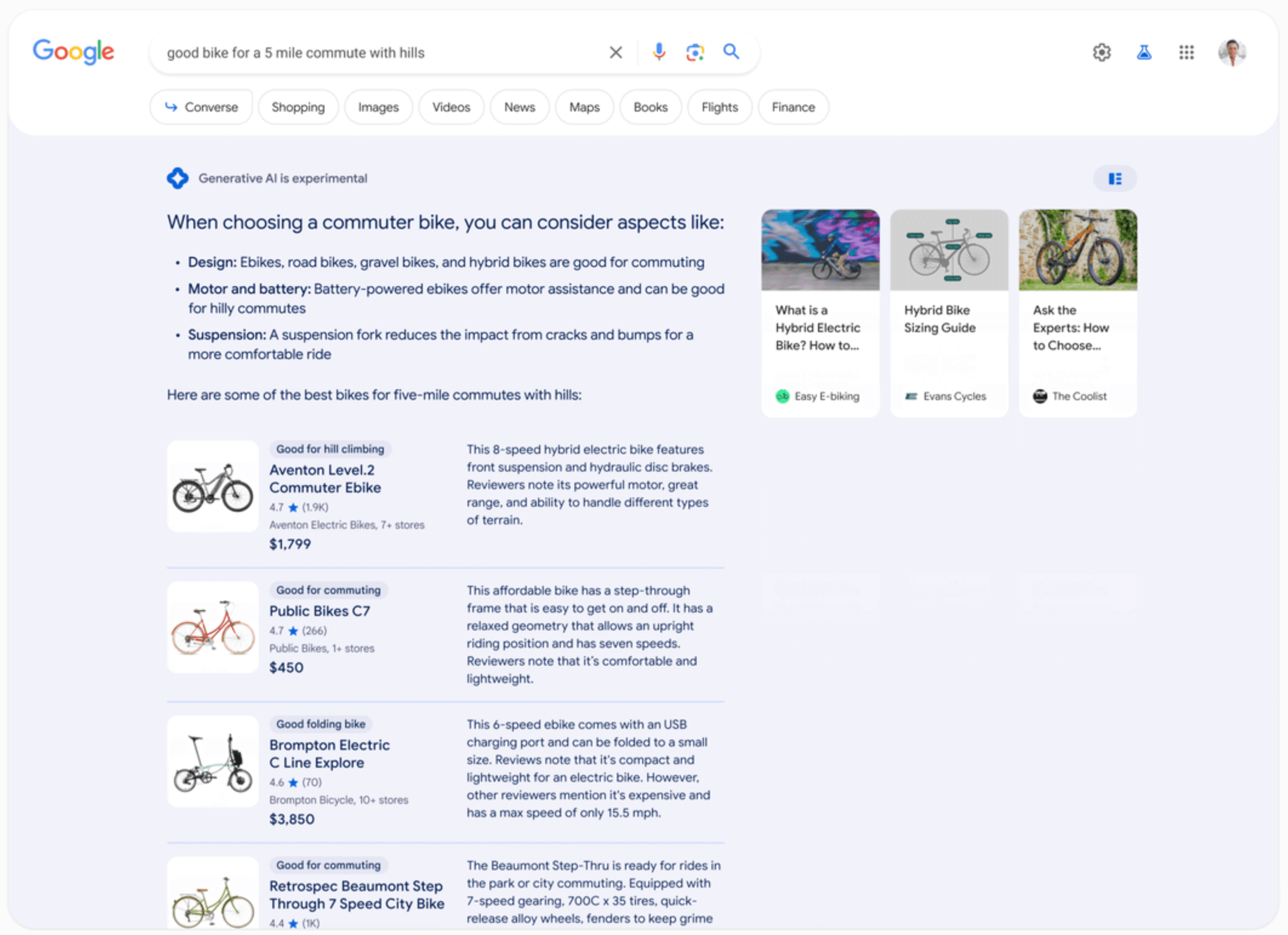Amazon is summarizing reviews using AI, turning all reviews for each product into a few sentences that best describe consumer feedback. The feature is a building block of Amazon’s AI ambitions.
Amazon is testing a feature that adds a text block above individual reviews with a subline “Al-generated from the text of customer reviews.” Presumably, it ingests all reviews and identifies each product’s most important features and criticisms. Amazon had previous experiments before this, providing star ratings by product feature, but this latest iteration is the most user-friendly yet. Mark Wieczorek, CTO at Fortress Brand, first discovered this new feature.
“This wearable computer has received positive feedback from customers in terms of quality, ease of use, value, appearance, and battery life. Customers have praised the accuracy and simplicity of the watch, as well as its ease of connection to phones and navigation. The product is also considered a great value by most customers. However, some customers have expressed concerns about the battery life, with some reporting that it needs to be charged often. Mixed opinions have been expressed about the product’s performance, size, and charging. Overall, this wearable device seems to be a good choice for those looking for a high-quality, easy-to-use, and affordable option,” reads the AI-generated summary for Apple Watch SE.
The generated summary is basic and doesn’t capture the full breadth of opinions voiced in reviews. It’s also unclear how well Amazon handles the proliferation of fake reviews to avoid summarizing fake reviews intermixed with genuine reviews. In computer science, “garbage in, garbage out” is the concept that flawed or nonsense input data produces nonsense output.

AI-generated summaries are a pillar of the new Amazon shopping experience built on generative AI. Amazon has not released any details about it yet; however, they had several job listings that described it as, “We are reimagining Amazon Search with an interactive conversational experience that helps you find answers to product questions, perform product comparisons, receive personalized product suggestions, and so much more, to easily find the perfect product for your needs.”
Google is working on similar technology too. Currently, in limited beta, they describe it as, “With generative AI in Search, we can help you understand the full picture when you’re shopping, making even the most considered and complex purchase decisions faster and much easier. When searching for a product, you’ll get a snapshot of noteworthy factors to consider and products that fit the bill. You’ll also get product descriptions that include relevant, up-to-date reviews, ratings, prices, and product images.”

Both Amazon and Google are building towards a similar future of shopping. Instead of the decades-old search bar that answers with a grid of product results, prompting the shopper to click on individual results, read reviews, and compare prices, the new experience will include fewer but more relevant results and, at least on Amazon, likely show the AI-generated summary of reviews. It’s about turning the mountains of data on shopping behavior and user preferences into a simpler shopping experience.
“Nobody wants to go through 10,000 iPhones. Show me the four best options,” said Devin Wenig, then CEO of eBay, in 2018. At the time, eBay was trying to transition from a catalog of listings (one for each iPhone listed) to a catalog of products (one for each iPhone model). Amazon has the same problem today, caused by the explosion of private label brands. Every search has thousands of possible variants, most seemingly the same. Amazon has no answer to that - it hopes the first few results are best or the shopper will do the work to find what’s best for them.
Over the past few years, Amazon has abandoned consumer experience innovation and replaced it with ads. The generative AI race is forcing Amazon to return to it. Summaries of reviews are a small experiment, lost in the endless list of features on the product page, but it hints that a lot more is coming. Amazon’s answer to “good bike for a 5 mile commute with hills” today is a random list of bicycles (Alexa isn’t much help either). That’s what’s going to change.

